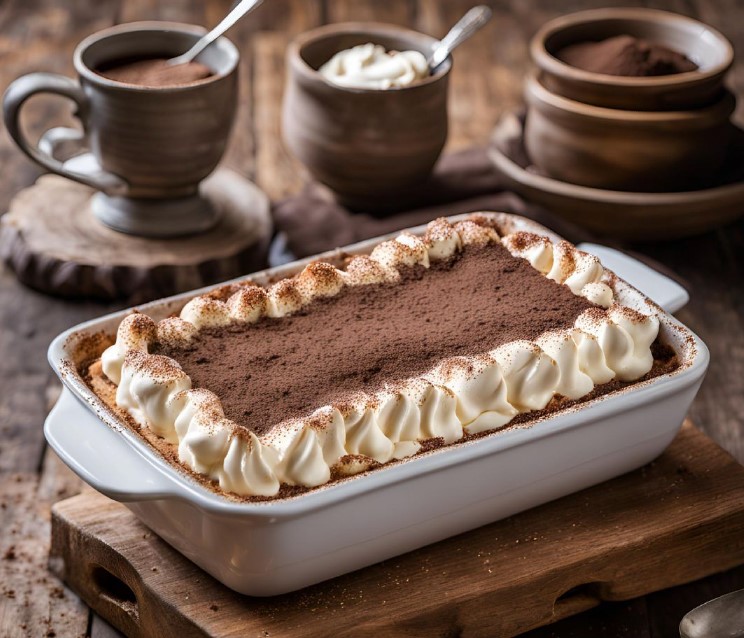

The Classic Tiramisu Recipe: A Heavenly Taste of Italy. Tiramisu, the beloved Italian dessert that means "pick me up" in Italian, has become a global favorite. Its rich combination of coffee-soaked ladyfingers, luscious mascarpone cream, and a delicate dusting of cocoa creates an indulgent treat that delights the senses with every bite. With its velvety texture and harmonious balance of flavors, tiramisu is a dessert that never fails to impress, whether served at a dinner party, a holiday celebration, or simply as a well-deserved treat after a long day.
In this article, we’ll explore the origins of tiramisu, its transformation from a regional delicacy to an international sensation, and provide you with a step-by-step guide to making this timeless dessert at home. Whether you are an experienced baker or a novice in the kitchen, the classic tiramisu recipe is sure to become a go-to in your culinary repertoire.
While tiramisu is widely recognized as one of Italy's most iconic desserts, its history is surprisingly recent. The origins of tiramisu can be traced to the Veneto region in northern Italy, specifically the town of Treviso, where it is believed to have been created in the 1960s or 1970s. The dessert was allegedly invented by a chef named Roberto Linguanotto, who is credited with developing the recipe for a restaurant called Le Beccherie. The story goes that Linguanotto combined layers of soft, coffee-soaked biscuits with a mascarpone cream filling, topped it with cocoa powder, and served it as a sweet treat for guests.
However, like many traditional dishes, the exact origins of tiramisu are subject to debate. Some claim the dessert has even older roots, with possible connections to regional Italian pastries dating back to the 18th century. In any case, the modern version of tiramisu has evolved into a beloved dessert around the world, with variations popping up in nearly every corner of the globe.
One of the reasons tiramisu is so universally adored is its simple yet luxurious combination of ingredients. The key components of a classic tiramisu are:
Ladyfingers (Savoiardi): These light, airy biscuits are the base of the dessert. Soaked in coffee, they absorb the liquid but retain their structure, providing a delicate contrast to the creamy filling.
Mascarpone Cheese: This Italian cream cheese is the heart and soul of tiramisu’s luscious filling. Mascarpone’s smooth, velvety texture and slightly sweet flavor pair beautifully with the bitter notes of the coffee.
Egg Yolks: Egg yolks add richness and create a creamy texture when combined with the mascarpone cheese. They are often blended with sugar to form a smooth custard-like layer.
Coffee (or Espresso): The coffee is what gives tiramisu its signature flavor. Strong brewed coffee or espresso is traditionally used, and it’s the key ingredient that imparts the dessert’s characteristic depth. The coffee is usually mixed with a bit of liqueur like Kahlúa or Marsala wine, but this is optional.
Heavy Cream: Heavy cream is whipped to stiff peaks and folded into the mascarpone mixture to lighten the texture and add a rich, airy quality.
Cocoa Powder: A dusting of unsweetened cocoa powder is the final touch that balances the sweetness of the mascarpone and enhances the coffee’s deep flavors. It also gives the dessert its signature dark, velvety finish.
Sugar and Vanilla Extract: These ingredients are used to sweeten the mascarpone cream and add subtle flavor depth.
The magic of tiramisu lies in the perfect balance of these components. Each element is simple on its own, but together they create a complex, indulgent flavor profile that is irresistibly delicious.
Tiramisu has endured for decades because of its versatility, simplicity, and irresistible taste. Unlike many other desserts that require intricate techniques or a long list of hard-to-find ingredients, tiramisu is accessible to home cooks of all skill levels. The beauty of this dessert lies in its ease of preparation, its balance of flavors, and its ability to be made ahead of time. The delicate layers of creamy mascarpone and coffee-soaked ladyfingers create a harmonious union that appeals to almost everyone—whether you love coffee, chocolate, or just a great dessert.
Tiramisu is also a perfect dessert for entertaining. It can be made in a large dish or individual portions, making it ideal for dinner parties, family gatherings, and celebrations. Its ability to be prepared in advance means that you can focus on enjoying your time with guests rather than spending hours in the kitchen.
Moreover, tiramisu has a universal appeal. It can be adapted in numerous ways to suit different tastes. For example, some variations use chocolate or fruit to add a unique twist to the traditional recipe. But, no matter how you choose to make it, the classic tiramisu remains an elegant and comforting choice that will always hold a special place in the hearts of dessert lovers around the world.
--
Making tiramisu is a beautiful journey into the heart of Italian cuisine. With just a few simple ingredients and some patience, you can recreate a dessert that is both timeless and extraordinary. Whether you’re making it for a special occasion or just as a treat for yourself, this classic recipe will never disappoint. So gather your ingredients, roll up your sleeves, and get ready to enjoy a taste of Italy’s best-loved dessert. The indulgence and satisfaction of homemade tiramisu are only a few
Tiramisu relies on just a few key ingredients, so the quality of each one matters. For the best flavor and texture, use fresh mascarpone cheese, freshly brewed coffee or espresso, and heavy cream with a high fat content. Opt for Italian ladyfingers (savoiardi) if possible, as they tend to have the right balance of texture—firm but light enough to absorb the coffee without getting soggy. The better the ingredients, the better the overall result!
Ladyfingers are meant to be soaked in coffee or espresso, but don’t overdo it! Dip each ladyfinger in the coffee mixture for just 1-2 seconds—just enough to absorb the liquid but not so long that they become mushy. Over-soaking will lead to a soggy tiramisu, which detracts from the dish’s signature light, airy texture. A quick dip is key to getting the perfect balance of moist and firm.
When preparing the mascarpone cream, whisk the egg yolks and sugar until the mixture becomes pale and creamy. This step is crucial for achieving the rich, velvety texture of the mascarpone filling. The yolks help stabilize the cream, creating a smooth, custard-like consistency that holds up well in layers. Don’t rush this process—whisking until pale ensures the cream blends perfectly with the mascarpone and heavy cream.
Tiramisu needs to be refrigerated for at least 4 hours to set properly, but for the best results, it’s best to let it chill overnight. The resting time allows the flavors to meld, the layers to firm up, and the dessert to achieve its signature texture. Patience is key—don’t be tempted to rush the chilling process. Overnight chilling also helps the coffee flavor deepen and develop, making every bite more satisfying.
For the finishing touch, always use unsweetened cocoa powder for dusting the top of your tiramisu. Sweetened cocoa can make the dessert overly sugary, while unsweetened cocoa provides a balanced, slightly bitter contrast to the sweetness of the mascarpone filling. For an extra layer of flavor, you can also garnish the tiramisu with shaved dark chocolate, but don’t skip the cocoa powder—it’s what gives tiramisu its signature look and flavor!
Yes! If you’re concerned about using raw eggs in this recipe of tiramisu (particularly for safety reasons), you can use pasteurized eggs or opt for a cooked egg custard base. Alternatively, you can skip the egg yolks entirely and use whipped heavy cream mixed with mascarpone and a small amount of sugar for the filling. While this will slightly alter the texture, it still produces a delicious result.
Yes, tiramisu can be made ahead of time and is actually better when it sits for a few hours or overnight. This allows the flavors to meld and the layers to firm up. Ideally, you should refrigerate it for at least 4 hours, but overnight is best for the best texture and flavor.
Heavy cream is essential for getting the right texture for the mascarpone mixture. Whipped cream (which often has sugar and stabilizers) might not yield the same results. You should use heavy cream with a high fat content (at least 36%) to get the rich and fluffy consistency that is characteristic of tiramisu.
Mascarpone is a key ingredient for authentic tiramisu, providing the creamy texture and slightly sweet flavor. While it’s best to use mascarpone, you can substitute it with a mixture of cream cheese and whipped cream if mascarpone is unavailable. Use a 2:1 ratio of cream cheese to whipped cream and blend them until smooth. However, this will change the flavor and texture slightly.
For the best flavor, espresso is ideal because it’s concentrated and has a deep, bold flavor. However, if you don’t have espresso, you can use strong brewed coffee as a substitute in this tiramisu recipe. Make sure the coffee is cooled to room temperature before soaking the ladyfingers, as hot coffee can make them soggy.
Yes, you can omit the coffee liqueur (like Kahlúa) or Marsala wine if you prefer an alcohol-free version. The tiramisu will still taste great, as the coffee-soaked ladyfingers and creamy mascarpone filling provide plenty of flavor. If you want to add some extra depth, try using a dash of vanilla extract in place of the liqueur.
The key to perfect tiramisu is to briefly dip the ladyfingers in the coffee mixture—just a quick 1-2 second dip. If you soak them for too long, they’ll absorb too much liquid and become mushy. The goal is to moisten them enough so they retain their structure, giving you the ideal balance between soft and firm layers.
If your mascarpone cream is too runny, it may be because the mascarpone cheese wasn’t well-drained, or the whipped cream wasn’t whipped to stiff peaks. To fix this, try whipping the cream longer or chilling the mascarpone mixture before assembling. If it’s still too thin, you can add a bit more whipped cream or chill the dessert longer to let it firm up before serving.
Tiramisu does not freeze well because of its delicate texture. Freezing causes the layers to separate, and the mascarpone mixture may become watery when thawed. It’s best to make tiramisu fresh or store it in the refrigerator for up to 3 days. If you do need to freeze it, wrap it tightly and thaw it in the fridge for several hours, but the texture may not be the same.
Yes! Tiramisu can be made in individual servings with this recipe, which can be particularly elegant for parties or special occasions. You can layer the ingredients in small glass jars, cups, or bowls. Just be sure to adjust the soaking time for the ladyfingers according to the size of your serving container. Individual servings also allow for more customization, like adding extra toppings (e.g., shaved chocolate or berries).
Making tiramisu is a beautiful journey into the heart of Italian cuisine. With just a few simple ingredients and some patience, you can recreate a dessert that is both timeless and extraordinary. Whether you’re making it for a special occasion or just as a treat for yourself, this classic recipe will never disappoint. So gather your ingredients, roll up your sleeves, and get ready to enjoy a taste of Italy’s best-loved dessert. The indulgence and satisfaction of homemade tiramisu are only a few
Enjoy the yum :)